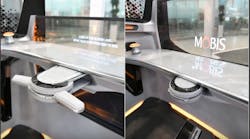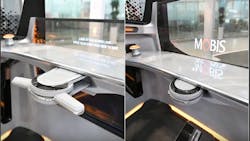Foldable Steering-Wheel System Built for Self-Driving Cars
What you'll learn:
- What design innovations went into creating the foldable steering wheel?
- Hyundai's push to build a robotaxi fleet.
A steering-wheel system in passenger cars usually comes in a circular form. It’s also a component that’s fixed on either the left or right side of the car’s dashboard, depending on the geographic region in which the vehicle will be employed. But both of these assumptions may soon become antiquated. Hyundai Mobis has developed a steering system technology that enables the folding and unfolding of the steering wheel to allow for more space in the driver's seat.
The Hyundai Mobis system features a steering wheel that can move forward and backward up to 25 cm (9.84 inches). Folding and unfolding the steering wheel at will can be done to accommodate either autonomous driving or driver mode, selected according to need. Development of the technology took approximately two years and the company currently is filing patents globally.
To develop the folding steering system, the company designed new core parts, including a column and a reaction force control device. Then a sliding rail mechanism was applied that allows for the steering wheel to slide in and out reliably.
The control system transmits steering power generated from the steering wheel to the vehicle’s wheels by means of electronic signals. It can automatically increase or reduce the reactivity of the steering wheel at parking lots or highways to provide stability, and provide comfortable steering that optimizes the driving experience on winding roads. Hyundai Mobis also removed all mechanical connections to filter out uncomfortable body roll that can be transmitted to the steering wheel when passing over potholes and bumps on the road.
The system enables different applications, including a storage type where the steering wheel can be retracted into the dashboard. This would create a wider and more comfortable driving environment as well as allow for design innovation in the vehicle’s interior space. For example, when the steering wheel is folded in autonomous-driving mode, a more flexible cabin layout can be created—the driver's seat could rotate 180 degrees to allow for an environment like a conference room where one is able to freely talk with the passengers in the back seat.
Level 4 Robotaxi
Hyundai is in the process of developing a self-driving taxi fleet. Developed in conjunction with Motional, the Hyundai Ioniq 5 Robotaxi is a Level 4 autonomous vehicle that’s capable of driving itself without human intervention, but can still be driven by a person. To date, Motional has provided over 100,000 self-driving rides, while maintaining a record of zero at-fault incidents, according to the company.
To transform the Ioniq 5 SUV into a self-driving taxi, Motional fitted the electric crossover vehicle with a suite of 30 sensors, including cameras, radar, and LiDAR units. The vehicle will be assembled by Hyundai. Hyundai says riders across the U.S. will be able to book an Ioniq 5 Robotaxi using the Lyft ride-sharing app starting in 2023.
The new Hyundai Mobis foldable steering system is compatible with a Steer by Wire (SBW) system previously developed by the company. The SBW system minimizes the vibrations that come from a rumble strip or a speed bump to the steering wheel, allowing the vehicle to drive in a comfortable and stable manner. It also provides a steering “feel” that can maximize driving performance.
Hyundai Mobis said vehicle steering performance in any driving situation has been optimized through intensive testing. In particular, a double safety system, including redundant sensors, are designed in duplicate with independent control of each to maintain a normal steering state even in an emergency situation.
“Hyundai Mobis is developing parts technology that will be applied to future cars in a completely new way beyond the level of reinterpreting the existing ones,” said Jang-don Choi, Executive VP and head of the chassis/safety unit at Hyundai Mobis. “Based on this, we will develop future-oriented innovative technologies.”

